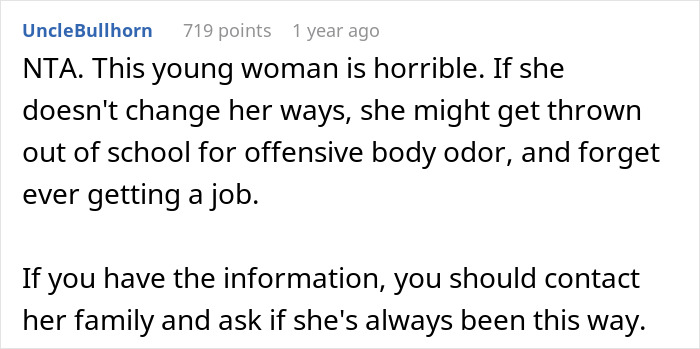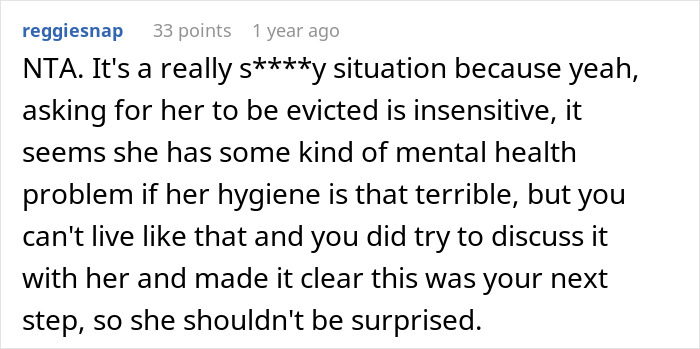Anyone who’s lived with different roommates may have at least one story of an unpleasant experience. It could be about stealing food, inconsiderate behavior, or, in the case of today’s story, deplorable hygiene.
A Reddit user dealt with a roommate who had not showered for four months. After trying to dialogue multiple times, she had no choice but to threaten eviction.
The woman now asks the AITA subreddit whether she took things too far.
Living with someone who refuses to practice proper hygiene can be a struggle

Image credits: AtlasComposer (not the actual photo)
A woman shared a room with someone who had not showered in four months




Image credits: Tirachard Kumtanom (not the actual photo)
She was forced to take drastic measures after her roommate continuously refused






Image source: [deleted]
A person’s refusal to practice proper hygiene may have deep-rooted reasons

Image credits: Timur Weber (not the actual photo)
The author didn’t specify why her roommate refused to shower. But as experts say, it’s not an automatic indicator of poor hygiene. For some people, it’s a byproduct of depression.
As explained by clinical psychologist Dr. Roberta Ballard, the brain fog caused by depressive episodes makes it harder for someone to take care of themselves.
“It is particularly common to have negative thoughts about self-worth,” Dr. Ballard told Medical News Today. “The confusion and memory problems make it more difficult to harness whatever energy a person may have, so it is not unusual for an individual who is depressed to feel that showering is too difficult and not important.”
Dr. Ballard adds that the lack of energy brought on by their mental condition also plays a role.
“When someone is depressed, their energy is so depleted that it is easy to feel overwhelmed by things that are usually a part of everyday life.
“As a result, things like routine hygiene often fall by the wayside.”
Bringing up personal hygiene issues requires a tactful approach

Image credits: KATRIN BOLOVTSOVA (not the actual photo
Experts recommend a tactful approach because poor hygiene can be a very personal issue. Behavior change expert Kerry Patterson shared some ways to go about it in an article he wrote for Psychology Today.
One of his tips is to try to give the person an out. He gave an example of two co-workers, one of whom wasn’t keen on practicing proper self-care.
“For example, ‘I get the feeling that maybe you’ve been exercising before work recently. In any case, we work so close together that I’m wondering if we can talk about a change that’s affecting our working environment.’
“At this point, you’ve delicately placed the problem in the open, and the sooner you finish the discussion, the better. This is all about helping the other person save face.”
Based on her story, it appears the author exhausted all her options regarding diplomatic discussions. And as Patterson stated in his article, “You shouldn’t have to suffer in silence.”
She did what she had to do, and while it may have been harsh, it is what the situation called for at that point.
The woman provided more info in the comments of her post



Most people sided with her















She says she was first threatened with legal action for discrimination, but her roommate eventually relented











